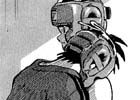Katsu!
| Genre: Action/Drama/Romance | ||
| Length: 16 Volumes | ||
| Allegiance: Shogakukan | ||
| Mangaka: Adachi Mitsuru | ||
| Vintage: 2002 – 2005 | ||
| Intelligence Agency Report by: Kuzu Ryu Sen | ||
| Satoyama Katsuki is just your average young man currently attending his first year of high school. However, one rainy spring day, his childhood best friend Kawakami Kyouta introduces him – from a distance of course – to a young lady that, against school regulations, is secretly working at a gas station. Kyouta’s research reveals that this Mizutani Katsuki is not only in the same class as the pair, but also that her father runs the famed Mizutani Boxing Gym. In the impetuosity of youth, the pair drop 27,000 yen on a 1 month membership at the Gym, and Satoyama uncovers two revelations. First, that he is connected with Japanese boxing in ways that he never could have imagined, and second, that Mizutani Katsuki detests boxing with a passion. | ||
|
|
||
| Research Agent Report by: Kuzu Ryu Sen | ||
| Plot Characters Impact Visual |
8.75 9.25 9.50 9.00 |
|
| Overall | 9.25 | |
| (not an average) | ||
| Katsu! is, in many ways, a bit of a departure from familiar territory for Adachi Mitsuru. For the second major project, he has chosen to deviate from high school baseball to another sport, in this case, boxing. However, a change of topic is hardly the only difference between Katsu! and works like Touch or H2, or even Rough. Perhaps its merely the nature of the sport diffusing into the tone of the story, but Katsu! is a great deal more violent and darker than any of Adachi’s previous major works. Yet this new tone is relegated to self-analysis rather than inter-character relationships, and the end result is still the same predictable yet very charming Adachi romance involving our male lead Nii- Uesu- Kuni- er… Satoyama-kun.
Compared to Touch, Rough, or H2, the intra-cast relationships in Katsu! are almost simplistic to the point of completely predictable. The complex love polygons and rivalry polygons that are so common in other Adachi titles are instead whittled down to the bare minimum only to instill a tiny shred of suspicion into the reader. Instead, Katsu! echoes the sport it depicts by analyzing the past, present, and future for each main character individually, and compiling their ever dynamic personalities from these events. For the most part, plot events are driven not by one character acting directly on another with love confessions or promises to reach Koushien, but self-realisations that lead to adaptation of new, grander goals and subsequent changes in personality. Katsu!, much like boxing, is about self-growth, self-improvement, and self-motivation, and as such, its characters almost emanate loneliness at times. However, Adachi has still managed to work his trademark comedic charm into his most serious work. Minor characters like Kyouta, Sakura, Hanzawa, and Harune keep the tone relatively light during occasional chapters that don’t concern the main plot, and the relationship between the two Katsukis is refreshing and delightful to observe from outset to closure. As a result, what emerges is a powerful story that, through various checks and balances, doesn’t bog down in endless self-introspection. While Adachi Mitsuru is better known for his long tales of high school baseball and the glory of Koushien, it can be said that his non-baseball works have a greater impact on the reader. Katsu! is certainly a prime example of a situation where focusing on the self-driven development of individual characters would triumph over a character-interaction driven plot. It doesn’t particularly excel in the action department and the romantic aspects are skimmed over a bit, but Katsu! is well worth the read for its gritty, determined, and courageous characters, and is a well-executed alternative to the standard Adachi work.
|
||




